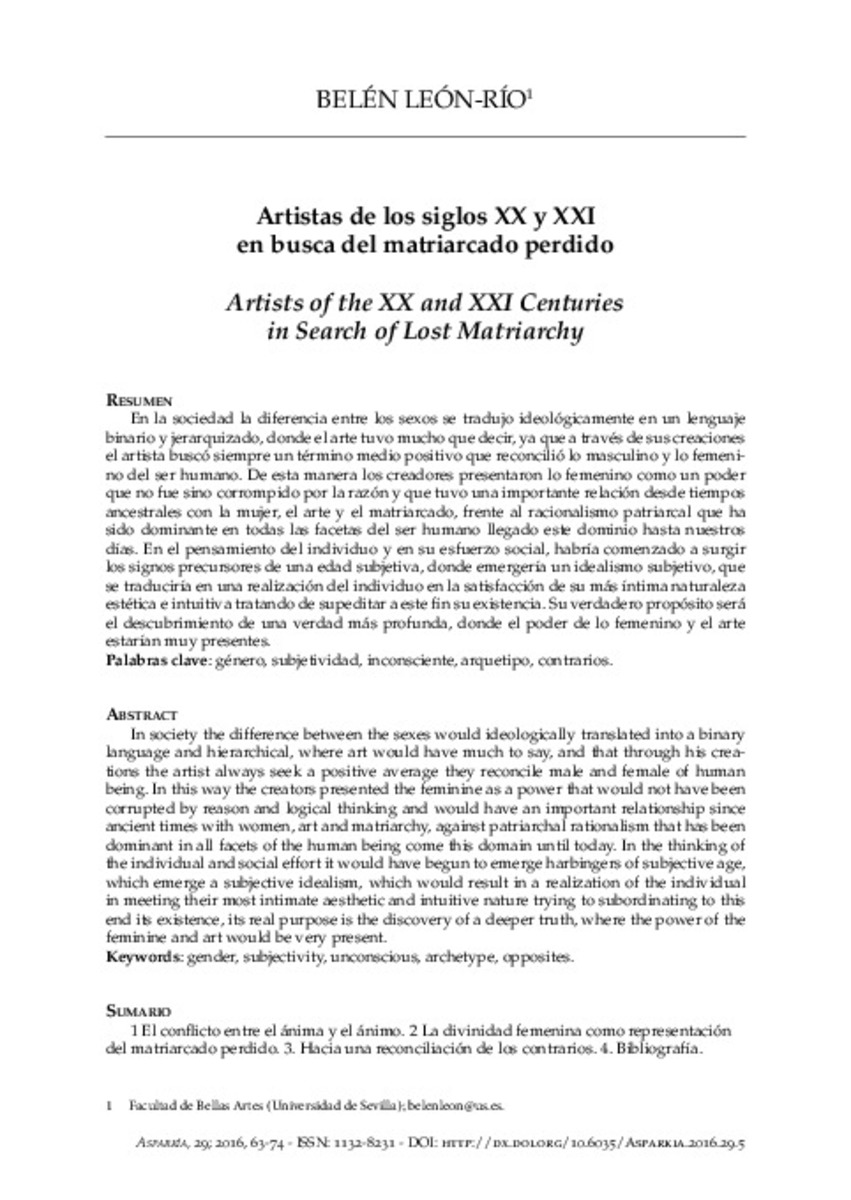Mostrar el registro sencillo del ítem
Artistas de los siglos XX y XXI en busca del matriarcado perdido
| dc.contributor.author | León-Rio, Belen | |
| dc.date.accessioned | 2017-01-30T10:59:46Z | |
| dc.date.available | 2017-01-30T10:59:46Z | |
| dc.date.issued | 2016 | |
| dc.identifier.citation | LEÓN-RÍO, Belen. Artistas de los siglos XX y XXI en busca del matriarcado perdido. Asparkía. Investigació feminista, 2016, no 29, p. 63-74. | ca_CA |
| dc.identifier.issn | 1132-8231 | |
| dc.identifier.issn | 2340-4795 | |
| dc.identifier.uri | http://hdl.handle.net/10234/165721 | |
| dc.description.abstract | En la sociedad la diferencia entre los sexos se habría traducido ideológicamente en un lenguaje binario y jerarquizado, donde el arte tendría mucho que decir, ya que a través de sus creaciones el artista buscaría siempre un término medio positivo que reconciliaría lo masculino y lo femenino del ser humano. De esta manera los creadores presentarían lo femenino como un poder que no habría sido corrompido por la razón y el pensamiento lógico y que tendría una importante relación desde tiempos ancestrales con la mujer, el arte y el matriarcado, frente al racionalismo patriarcal que ha sido dominante en todas las facetas del ser humano llegado este dominio hasta nuestros días. En el pensamiento del individuo y en su esfuerzo social, habría comenzado a surgir los signos precursores de una edad subjetiva, donde emergería un idealismo subjetivo, que se traduciría en una realización del individuo en la satisfacción de su más íntima naturaleza estética e intuitiva tratando de supeditar a este fin su existencia, su verdadero propósito será el descubrimiento de una verdad más profunda, donde el poder de lo femenino y el arte estarían muy presentes. | ca_CA |
| dc.description.abstract | In society the difference between the sexes would ideologically translated into a binary language and hierarchical, where art would have much to say, and that through his creations the artist always seek a positive average they reconcile male and female of human being. In this way the creators presented the feminine as a power that would not have been corrupted by reason and logical thinking and would have an important relationship since ancient times with women, art and matriarchy, against patriarchal rationalism that has been dominant in all facets of the human being come this domain until today. In the thinking of the individual and social effort it would have begun to emerge harbingers of subjective age, which emerge a subjective idealism, which would result in a realization of the individual in meeting their most intimate aesthetic and intuitive nature trying to subordinating to this end its existence, its real purpose is the discovery of a deeper truth, where the power of the feminine and art would be very present. | ca_CA |
| dc.format.extent | 12 p. | ca_CA |
| dc.format.mimetype | application/pdf | ca_CA |
| dc.language.iso | spa | ca_CA |
| dc.publisher | Publicacions de la Universitat Jaume I | ca_CA |
| dc.relation.isPartOf | Asparkía: investigació feminista, 2016, núm. 29 | ca_CA |
| dc.rights.uri | http://creativecommons.org/licenses/by-sa/4.0/ | * |
| dc.subject | gender | ca_CA |
| dc.subject | subjectivity | ca_CA |
| dc.subject | unconscious | ca_CA |
| dc.subject | archetype | ca_CA |
| dc.subject | opposites | ca_CA |
| dc.subject | género | ca_CA |
| dc.subject | subjetividad | ca_CA |
| dc.subject | inconsciente | ca_CA |
| dc.subject | arquetipo | ca_CA |
| dc.subject | contrarios | ca_CA |
| dc.title | Artistas de los siglos XX y XXI en busca del matriarcado perdido | ca_CA |
| dc.title.alternative | Artists of the XX and XXI Centuries in Search of Lost Matriarchy | ca_CA |
| dc.type | info:eu-repo/semantics/article | ca_CA |
| dc.identifier.doi | http://dx.doi.org/10.6035/Asparkia.2016.29.5 | |
| dc.rights.accessRights | info:eu-repo/semantics/openAccess | ca_CA |
| dc.relation.publisherVersion | http://www.e-revistes.uji.es/index.php/asparkia/article/view/1916/1994 | ca_CA |
Ficheros en el ítem
Este ítem aparece en la(s) siguiente(s) colección(ones)
-
Asparkía_2016_núm.29 [23]








